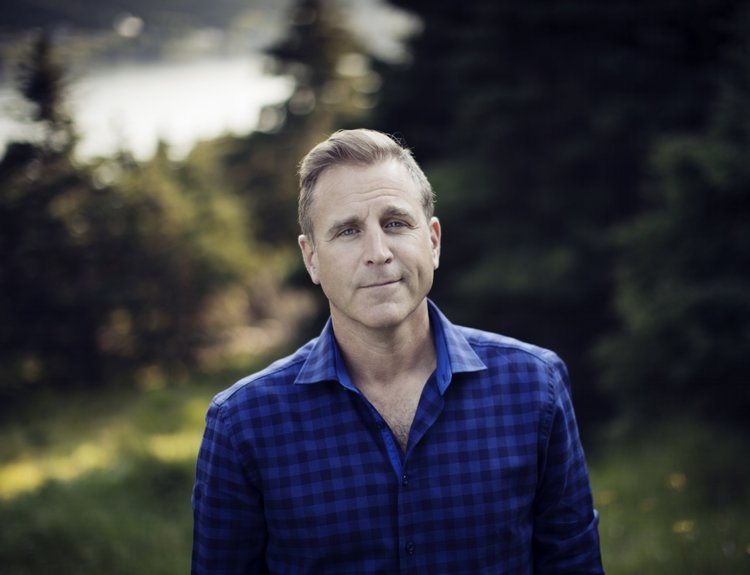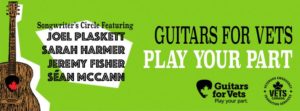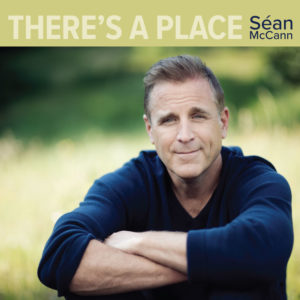
Sean McCann will be marking six years of hard-earned sobriety on Nov. 9. The following day, Friday, Nov. 10, he will be taking the stage at the Algonquin Commons Theatre in Ottawa, along with musical pals Sarah Harmer, Joel Plaskett and Jeremy Fisher, for a special fundraising concert to help Canadian military veterans who struggle with emotional and psychological trauma, many of whom are, or were homeless.
The Guitars For Vets: Play Your Part show sees all artists donating their time, with 100 per cent of the $100 ticket price going to purchase a guitar for a veteran, who will then be partnered with another veteran to teach them how to play it. McCann personally negotiated with music industry retailer Long & McQuade to find a quality starter guitar at a reasonable cost. So with 700 tickets available, there are 700 guitars that can be potentially put in the hands of a veteran – a practical, positive and eminently impactful way to really help those who have been scarred through their service to our nation.
McCann has since become a fierce advocate for helping at-risk veterans getting practical, individual help and sees Guitars for Vets as a wonderful way to have a direct, demonstrably positive impact on the life of a veteran struggling with deep emotional and psychological wounds.
Guitars for Vets operates under the umbrella of Veterans Emergency Transition Services (VETS) and McCann is the National Guitar Ambassador for the Guitars for Vets program.
“What these folks are doing is low key. It’s grass roots and was started by a husband and wife three years ago and now they have little chapters all over Canada because people want to do it and it works. The reason I am involved is because what they needs is guitars. The venue has 700 seats so that means we can get 700 guitars. It’s a great way to park $100 and have it actually go somewhere,” he said, explaining that his own first-hand encounters with homeless veterans, coupled with his own battle with various emotional demons, compelled him to get involved.
“I did a Boots on the Ground walk here in Ottawa, which is veterans looking for other veterans who are homeless and we found some, and so that motivated me to help. I am not a military person. I don’t have any military background at all. I actually call myself a pacifist. But what I saw that night and what I have discovered since them is shocking to me. We should be doing better so I was like, how can I help? They talked to me about Guitars for Vets and I understood that concept because I know how a guitar can help you because my guitar really helped me when I was in really tough times. I would credit my guitar with saving my life.
 “And they have a program where vets are teaching other vets to play guitar and what the guitar can do is it can really break the cycle of despair when you’re desperate. The government makes a big deal out of what they’re doing for veterans but I know from dealing with them for the past year and a half, many of them can’t get the services they need and they certainly can’t get them fast.”
“And they have a program where vets are teaching other vets to play guitar and what the guitar can do is it can really break the cycle of despair when you’re desperate. The government makes a big deal out of what they’re doing for veterans but I know from dealing with them for the past year and a half, many of them can’t get the services they need and they certainly can’t get them fast.”
McCann’s own healing journey began just before he left Great Big Sea in the fall of 2013. In a band known for its hard-partying lifestyle, he was an enthusiastic partaker, to the point where he became an alcoholic. But there lay a deep, dark secret eating away at McCann’s soul that was driving the need to medicate to the point of near oblivion at times.
“I carried around a horrible secret for most of my life – for 37 years. I was abused by my priest when I was 15 and that put me on a path and I used alcohol to not have to face the truth. When it came down to it, I had to stop drinking because it was killing me and it was destroying my family. It wasn’t easy because Great Big Sea was a huge party band and that was my income. I made a lot of money. I was a high functioning alcoholic. I got to a point where I quit drinking and was actually sober for the last tour and that didn’t work out very well obviously,” he explained.
“At my lowest point, when I sobered up, I lost all my friends. I was very alone and then I started to remember what the priest did to me. I had nightmares and I really wanted to drink. It was around the third month [of sobriety] when the nightmares came back and I so wanted to drink. But I didn’t, I picked up a guitar instead. And I started to write songs that spoke to my recovery. These weren’t anthems about drinking, which is literally 80 per cent of the Great Big Sea catalogue. I am not trying to shit on that catalogue because I did some good work there and I wish we had done more. But at a certain point you can only defer the truth for so long, and that’s all booze and drugs do. At some point you’ve got to do the work and acknowledge what happened. And it’s not f***ing easy, but you’ve got to do it, or you’ll be stuck.”
The guitar allowed the cathartic healing process begin as he first composed the album Help Yourself (2014), followed by You Know I Love You the following year. His latest album, There’s A Place, was released earlier this fall, and represents a new phase of his healing continuum.
“Help Yourself had songs like Hold Me Mother and Stronger which were pivotal songs. Those songs saved me from total destruction, without a doubt. And that’s really why I am so passionate about this Guitars for Vets program because I know a guitar can save a life. Help Yourself resonated with thousands of people who really identified with my message and my own recovery journey. And, strangely enough, the feedback made me feel that I was not alone, in fact, which was a huge mistake to make because you’re never along, especially when you’ve got a guitar in your hand,” McCann explained.
“It was encouraging to me and was a great leap forward to realize there were other people in the same boat I guess. And that compelled me to not give up and it keeps me sober today. I kept writing songs and did an album called You Know I Love You which was me coping with my anger issues and using love as the antidote. I felt good singing those songs – they made me happier. And I kept moving down my path and this new record There’s A Place represents where I am today. I spend a lot of time in my car going to these little towns, talking and doing shows, working with people, and it’s kind of settled me into a different lifestyle where I am able to listen and hear. I am more awake than I have ever been.
 “This record was me moving around slowly, but taking stock. And what I have learned is that everyone needs to find their place. For me, it’s outdoors running on trails or in my kayak. Although the best version of myself is obviously onstage in front of people sharing my truth and talking openly and being sincere. There’s a real lightness to it, and that’s what I wanted this record to be about. It’s a meditative record and is encouraging people to get away from their screens and find a place where you can be at peace and think openly and honestly, without interruption, about yourself and where you are. That’s where I am at.”
“This record was me moving around slowly, but taking stock. And what I have learned is that everyone needs to find their place. For me, it’s outdoors running on trails or in my kayak. Although the best version of myself is obviously onstage in front of people sharing my truth and talking openly and being sincere. There’s a real lightness to it, and that’s what I wanted this record to be about. It’s a meditative record and is encouraging people to get away from their screens and find a place where you can be at peace and think openly and honestly, without interruption, about yourself and where you are. That’s where I am at.”
He said the vibe of There’s A Place and the overarching message of reconnecting with oneself and fellow humans on a real and authentic level ties in so well with the work he is doing to help veterans through the Guitars for Vets program.
“These guitars will save lives because they will be there when the people who own them need them. They will be there for them constantly and they will be dependable. They will be great intervenors, they will enable these people to deal with their trothing and work through it. They are weapons against despair and I would argue they are more useful than a lot of multi-million dollar government programs. It’s definitely a more practical return on your investment. For $100 you’re going to save a life. At the very least, for $100 you’re going to help somebody who truly needs help,” he said.
“When I hear numbers like $500 million I think its politicians saying big numbers because it’s cool shit to say; it makes them look good. My fear is that it won’t do as much good as it should. And a common sense approach, peer-to-peer support, in my experience with mental health over the last half dozen years, works best. I have been in recovery for six years and I have been doing a lot of volunteering and a lot of listening, and peer-to-peer is, in my opinion, a very effective and proven way to deal with real problems.
“And this program creates that peer-to-peer scenario. By giving them guitars they are actually creating groups everywhere where vets can talk to each other – the ones teaching guitar and the ones learning guitar. They have a reason to be face to face and really face their problems, perhaps for the first time ever. Music is soothing and has the ability to defuse a situation. Listen, these people are coming back damaged and they have been exposed to much too much. They are put in harm’s way and they experience things that cause them harm. We can’t create this mess and just leave it out there. They are not garbage. They are people – they are our people. The suicide rate is going up among veterans and the military and I have to believe that part of the reason is that the system has failed them.”
It would have been a dereliction of journalistic duty as part of this interview if McCann wasn’t asked to comment on the recent passing of iconic Tragically Hip frontman Gord Downie, since Great Big Sea had toured with and known the members of the Hip for many years.
“I can say that Gord Downie was never a man for just small talk; he was open to any conversation. He was interested in ideas and he wasn’t afraid to talk about anything which, in my business, is refreshing,” he said.
“I remember talking to him one night in Chicago. We had played a tiny little club and they were playing at the House of Blues and we went to the show and I remember talking to him that night about stage fright. I was having an issue with stage fright. He said, ‘how did your show go, man?’ And I always felt I could say anything to him and I said, ‘I couldn’t get behind it, man. I was in my own way. I was scared, I just couldn’t do it. I had this overwhelming feeling of dread.’ And he stopped me and he put his hand on my shoulder and said, ‘I know how you feel.’
“And I was like, wow, Gord Downie knows how I feel. Maybe I am going to be okay. We talked for about an hour after that, about being in that perilous situation as a singer and not knowing what to do. It’s like being a golfer without the ball. Anyways, it was a great conversation and that will give you an idea of how accessible he was and how kind he and indeed the rest of the band, were as people.”
McCann said he called in some favours from other musical pals to secure the impressive array of talent for the Play Your Part show in Ottawa on Nov. 10.
“I stuck my neck out. I am certainly overextended on the friendship bill. But Joel and Sarah and Jeremy are buddies of mine and I will owe them favours, but they’re definitely behind this. They get it; they understand what it’s for. They like the idea of Guitars for Vets because it’s a very simple idea and it makes sense, which is why they are coming and volunteering their time and talent.”
Doors open at 7:30 with the show beginning at 8 p.m.
For more information, or to book tickets for the Guitars for Vets: Play Your Part show, visit http://vetscanada.org/play-your-part.php.
For more information on McCann, There’s a Place and upcoming tour dates/speaking engagements, visit http://www.seanmccannsings.com.
- Jim Barber is a veteran award-winning journalist and author based in Napanee, ON, who has been writing about music and musicians for a quarter of a century. Besides his journalistic endeavours, he now works as a communications and marketing specialist. Contact him at jimbarberwritingservices@gmail.com
SHARE THIS POST:
